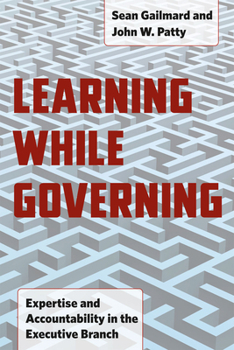Learning While Governing: Expertise and Accountability in the Executive Branch
(Part of the Chicago Studies in American Politics Series)
Select Format
Select Condition 
Book Overview
Although their leaders and staff are not elected, bureaucratic agencies have the power to make policy decisions that carry the full force of the law. In this groundbreaking book, Sean Gailmard and John W. Patty explore an issue central to political science and public administration: How do Congress and the president ensure that bureaucratic agencies implement their preferred policies? The assumption has long been that bureaucrats bring to their positions expertise, which must then be marshaled to serve the interests of a particular policy. In Learning While Governing, Gailmard and Patty overturn this conventional wisdom, showing instead that much of what bureaucrats need to know to perform effectively is learned on the job. Bureaucratic expertise, they argue, is a function of administrative institutions and interactions with political authorities that collectively create an incentive for bureaucrats to develop expertise. The challenge for elected officials is therefore to provide agencies with the autonomy to do so while making sure they do not stray significantly from the administration's course. To support this claim, the authors analyze several types of information-management processes. Learning While Governing speaks to an issue with direct bearing on power relations between Congress, the president, and the executive agencies, and it will be a welcome addition to the literature on bureaucratic development.
Related Subjects
Executive Branch Political Science Politics & Government Politics & Social Sciences




